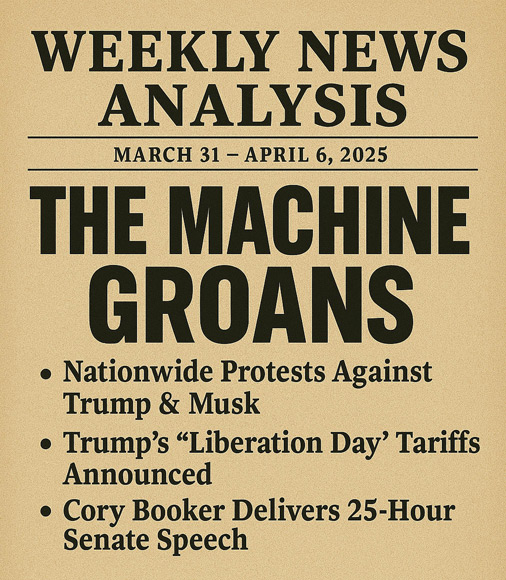
From city streets to Senate chambers, this week witnessed a profound collision of dissent and political spectacle, a moment that may be etched in history as a pivotal point in America’s trajectory. Millions took to the streets, markets quivered, and a lone voice resonated for 25 hours, decrying what he saw as the demise of democracy. Remember, after Democracy comes Tyranny.
This isn’t business as usual. This is the machine, supposedly grinding louder—metal on metal—while tyrants argue about who’s holding the wrench.
“Hands Off!” Protests Erupt Across America
Anti-Trump protests draw huge crowds across the U.S. – The Guardian
“I am undocumented, unafraid, queer and unashamed” – New York Post
This week, the streets of America “trembled” beneath the feet of millions. People flooded public squares from New York to Los Angeles, Boston to Austin in one of the most significant coordinated protests since the George Floyd uprising. Their rallying cry: “Hands off!” It's a simple slogan for a moment, loaded with complexity. They want to keep the status quo of the current tyrannical regime.
The immediate spark? A growing fear that Trump’s recent policies—backed by tech mogul Elon Musk—are pushing the U.S. into a new phase of authoritarianism, tech surveillance, and social dismantling. They aren’t wrong, but they seek their flavor of it. Protesters pointed to mass layoffs across Musk’s tech firms, the gutting of public oversight committees, and the rapid automation of systems that once employed tens of thousands.
Left-leaning organizers warned of “tyranny dressed in tech,” describing the fusion of corporate algorithms and government agendas. Meanwhile, right-wing pundits mocked the movement, cherry-picking soundbites to frame protesters as entitled and unstable. One viral quote from a demonstrator—“I am an immigrant, undocumented, unafraid, queer and unashamed”—became the centerpiece of media coverage on both sides, used alternately as a rallying call or a punchline. The entire event screams political theater.
But beyond the partisan filters, the underlying rhetoric was unmistakable: The people no longer trusted the institutions that claimed to represent them, only because Trump and Musk were doing it.
From placards denouncing layoffs disguised as “efficiency” to chants condemning the privatization of digital infrastructure, the mood was not just one of resistance, but of resounding rejection. It was a rejection of a system that feels increasingly out of touch, automated, and indifferent. In other words, it is not Democrat enforced.
“Liberation Day” Tariffs: Economic Warfare Hits Home
Trump’s sweeping tariffs cause global concern - The Guardian
Trump defends tariffs as tool for economic independence - Fox News
While Americans were marching in protest, Wall Street was bracing for impact. President Trump’s so-called “Liberation Day” tariffs officially went into effect this week, slapping new taxes on a massive range of foreign goods from China, the EU, and South America.
Markets responded immediately. The Dow dropped nearly 700 points within hours in a significant correction. Commodities spiked. Shipping companies announced price hikes. And major retailers warned of cost increases for everything from smartphones to cereal.
For some, this is the sound of freedom. “We’re finally standing up to foreign manipulation,” Trump declared in a Fox News segment, arguing that tariffs are the price of economic independence. His supporters echoed that sentiment across social media, hailing the move as a return to nationalist economics. Remember, Trump is a National Socialist, a term historically associated with the Nazi party in Germany. Who else were National Socialists?
However, the picture is starkly different for working families and small businesses, who are feeling the brunt of these policies.
A 10% increase in imported raw materials has already begun to ripple through the economy, pushing up production costs and squeezing profit margins. Farmers are bracing for retaliatory tariffs on U.S. exports. Economists warn of a stagflation scenario—where rising prices and slowing growth converge.
all Street, which typically cheers anything resembling protectionism under a Republican banner, seems uneasy. Analysts cited concerns that the tariffs could worsen supply chain instability and lead to consumer fatigue in an already brittle economy.
Beyond the financial fallout, the politics of “Liberation Day” speak volumes. The term itself suggests a kind of economic emancipation, but from what exactly? Foreign dependence? Or democratic accountability? As the people pay more for less, the celebration is hollow—like fireworks fired over an empty grocery aisle.
Cory Booker’s 25-Hour Speech: A Filibuster for the Record Books
Cory Booker sets filibuster record protesting Trump policies - The Guardian
Booker’s marathon speech - Wikipedia
While the streets roared and markets shook, one man stood still—for 25 hours straight.
New Jersey Senator Cory Booker delivered the longest filibuster in U.S. Senate history this week, speaking out against what he called a “total abandonment of the American promise.” His marathon protest targeted the sweeping deregulation packages and judicial appointments pushed through by the Trump administration in recent weeks. How much do you think this marathon protest cost taxpayers? Did it change anything? Will people remember this moment next week?
Booker read aloud testimonies from laid-off workers, passages from Supreme Court rulings, and quotes from past civil rights leaders. The atmosphere in the Senate was eerily quiet—many of his colleagues had left the chamber hours earlier. But Booker persisted, standing as a symbolic flame against what he painted as the slow death of American democracy.
Reactions split predictably. The left hailed the speech as heroic, calling Booker a modern-day orator of conscience. The right dismissed it as performative, accusing the Senator of political grandstanding without legislative impact—political theater from both sides.
But impact isn’t always measured in votes. For many, Booker’s stand became a focal point in a week filled with noise and confusion—a reminder that resistance can still take the form of words, not just marches or market crashes. But is this just empty faux resistance?
In many ways, his speech mirrored the concerns raised by protesters outside the Capitol: fears of creeping authoritarianism, the dismantling of public safety nets, and a government increasingly captured by private interests.
There seems to be a coordinated effort from the Left across the nation to “stand against” Trump and Musk. Who is funding and coordinating this?
Patterns in the Noise: The System Reveals Itself
These three stories form a mosaic—a portrait of a country pulled in multiple directions yet somehow locked into a single trajectory toward power consolidation, economic stability collapse, and the erosion of public voice.
The protests highlight rejecting corporate-government alliances. The tariffs show how economic policy is wielded more like a sword than a shield. Booker’s speech reveals how even the mechanisms of democracy struggle to remain relevant in a system that seems less interested in debate and more interested in decree.
There is no singular villain in this story. Trump may be at the center, but he’s not the architect of every policy. Musk may symbolize unchecked influence, but he’s not the only one profiting from chaos. Booker may be the voice of resistance, but even he admits the odds are stacked and has family ties that make him suspect of being a puppet for those pulling strings.
What we are witnessing is not the failure of a politician or a party—it is the culmination of decades of erosion. Of faith. Of accountability. Of boundaries.
And yet, in the noise, there is clarity. This week, the machine didn’t just move. It feigned a groan.
For a quick recap, listen to this week's news in verse!


